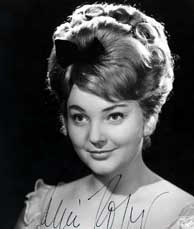(文字來自wikipedia)
Lucia Popp
Lucia Popp (12 November 1939 – 16 November 1993) was a notable Slovak operatic soprano.
She began her career as a soubrette soprano, and later moved into the light-lyric and lyric coloratura soprano
repertoire and then the lighter Richard Strauss andWagner operas. Her career included performances
at Vienna State Opera, the Metropolitan Opera, Covent Garden, and La Scala. Popp was also a
highly-regarded recitalist and lieder singer.
Life and career
Lucia Popp was born as Lucia Poppová, in Záhorská Ves in Slovak State (later Czechoslovakia and today
Slovakia).
Popp initially entered the Bratislava Academy to study drama. While she began her vocal lessons during
this period as a mezzo-soprano, her voice developed a high upper register to the degree that her professiona
l debut was as the Queen of the Night inMozart's The Magic Flute in Bratislava, a role she revived in a 1963
recording conducted by Otto Klemperer. In 1963, Herbert von Karajan invited her to join the Vienna State Opera,
where she debuted as Barbarina in Mozart's The Marriage of Figaro. Popp had strong ties to the Vienna State
Opera throughout her career, and in 1979 was named an Austrian "Kammersängerin". She made her Covent
Garden debut in 1966 as Oscar in Verdi's Un ballo in maschera, and her Metropolitan Opera debut in 1967
as the Queen of the Night (production designed by Marc Chagall).
During the 1970s, Popp turned from coloratura roles to lyric ones. Then, in the 1980s, she added heavier roles
to her repertoire, such as Elsa in Wagner's Lohengrin and Eva in the same composer's
Die Meistersinger von Nürnberg. As a result of this vocal progression, Popp sang various roles in the same
opera at different stages in her career, including Zdenka and Arabella in Richard Strauss's Arabella; Susanna
and the Countess in Mozart's The Marriage of Figaro; Queen of the Night and Pamina in Mozart's
The Magic Flute; Zerlina, Donna Elvira, and later Donna Anna in Mozart's Don Giovanni; Adele and Rosalinde
in Johann Strauss II's Die Fledermaus; Annchen and Agathe in Weber's Der Freischütz; and Sophie and
the Marschallin in Richard Strauss's Der Rosenkavalier.
Twice married, Popp died of brain cancer in 1993 in Munich, Germany, at the age of 54.[1] She was buried in
Cintorín Slávičie údolie, Bratislava. Her second husband, noted German tenor, Peter Seiffert, survives her.
In March 2007, on BBC Music magazine's list of the "20 All-time Best Sopranos" based on a poll of 21 British
music critics and BBC presenters, Lucia Popp placed seventh.





